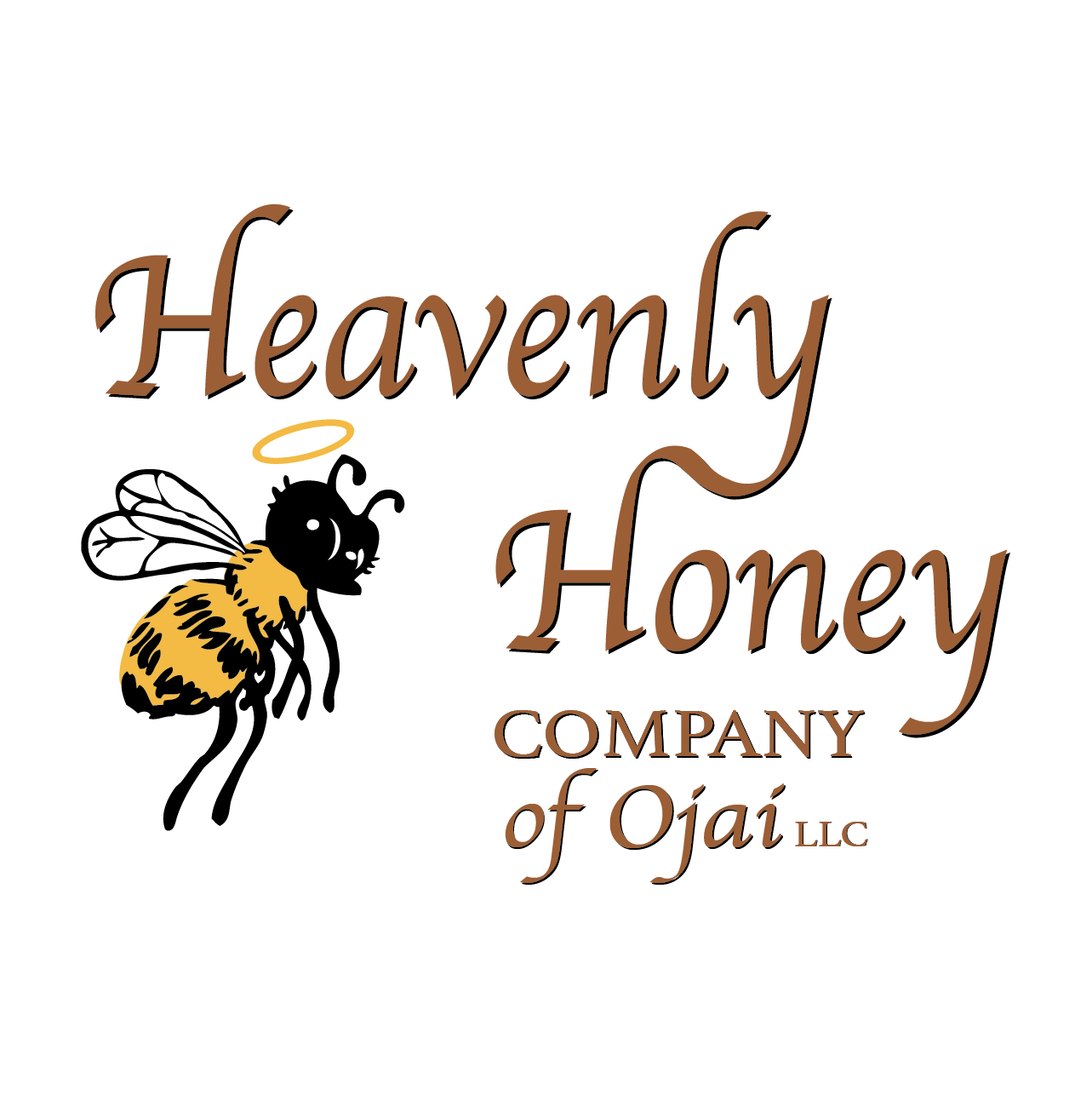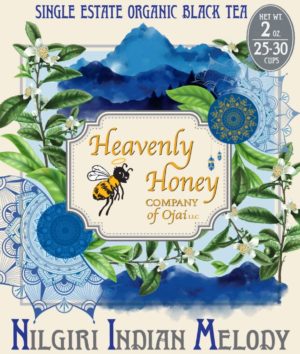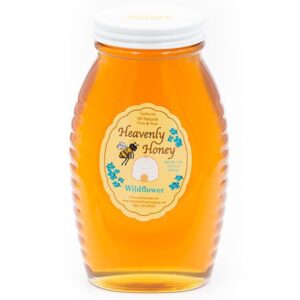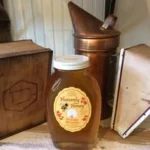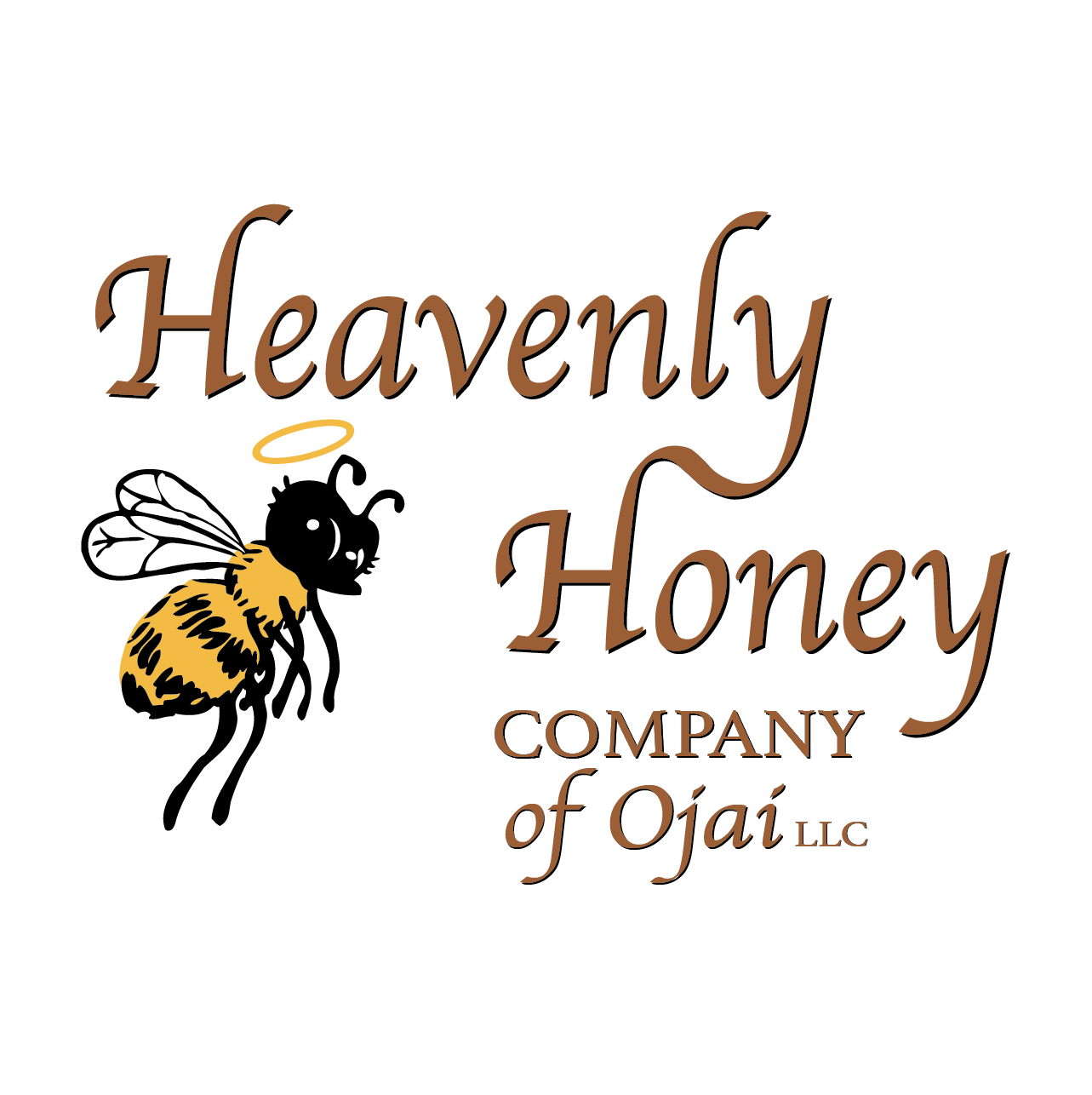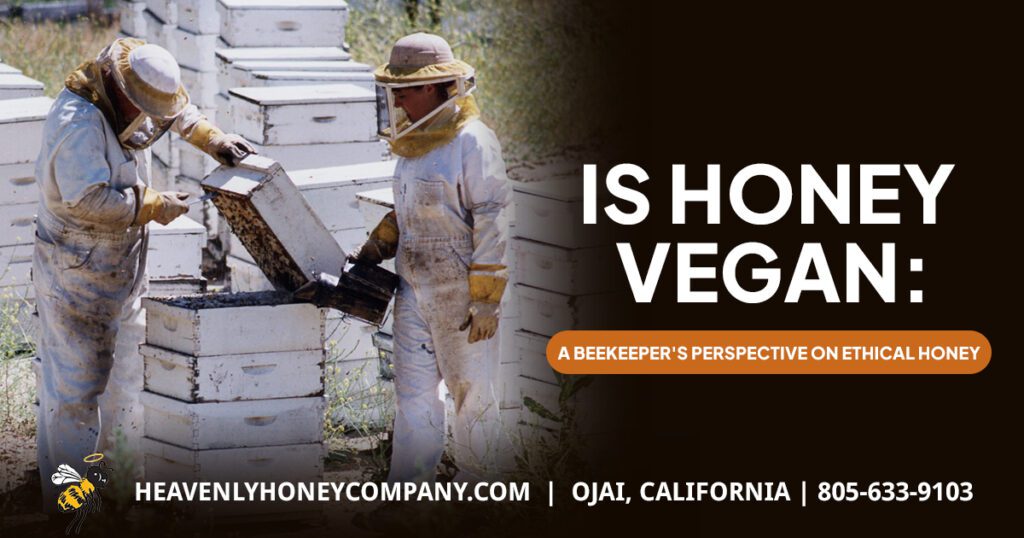
Hello from the sun-drenched Ojai Valley. My name is Barbara, and our family has been blessed to act as stewards for the honeybees here for generations. At the Heavenly Honey Company, our lives are deeply intertwined with the seasons, the fragrant citrus blossoms, and the wild sage that blankets our hills. This isn’t just a business for us; it’s a way of life passed down, built on a profound connection to this land and to the incredible creatures who make our work possible. It’s from this place of deep, first-hand experience that I want to talk with you today.
If you’re exploring a compassionate and conscious lifestyle, you’ve likely asked the question, “is honey vegan?”. It’s a valid and important query. The short answer is simple, but the conversation around it is nuanced and deserves a thorough explanation. My hope is not to persuade you, but to share an honest, people-first perspective from our corner of the world. My goal is for you to leave this article feeling you’ve learned enough to help achieve your goal, whether that includes honey or not. We’ll explore the valid concerns around beekeeping, our bee-first philosophy, and wonderful vegan alternatives, providing original insight that goes beyond the obvious.
💖 For the Conscious Kitchen: Our Family’s Favorites 💖
🌸 Raw, Unfiltered Wildflower Honey: A Symphony of Ojai’s Flora
For those who, after reading our story, feel that ethically-stewarded honey aligns with their personal path, we offer our Wildflower Honey. It’s a pure and raw variety crafted in the picturesque Ojai hills and valleys, directly reflecting the bee-first philosophy we cherish. Each year, this honey brings a new, complex flavor profile, a direct result of the diverse blooms our free-roaming bees thrive on. Its multifaceted taste strikes a perfect balance, making it an ideal choice for enhancing rooibos teas and toast without overpowering them. Each jar captures the essence of a multitude of wildflowers—a journey through the natural landscapes of Ojai in every spoonful.
Why choose it? A truly unique, complex honey that reflects our commitment to the bees and the diverse ecosystem they call home.
Perfect for: Enhancing herbal teas, drizzling on toast and whole grains, or experiencing the pure, changing taste of Ojai’s seasons.
☕ Organic Nilgiri Indian Melody Loose Leaf Tea
Our organic Nilgiri black tea is a beautiful, single-estate tea grown at the Korakundah Estate in the Nilgiri Blue Mountains. Harvested in the winter, this tea’s flavor is concentrated with sweet, rosy notes. As a purely plant-based product, it’s a wonderful way to enjoy nature’s goodness. High in flavonoids and rich in the amino acid L-Theanine, this tea can soothe and relax even the busiest mind. We especially love this tea served cold on hot Ojai days.
Pro tip: For your summertime iced tea, add just a bit of hot water to your favorite vegan sweetener (like the date or maple syrup we mentioned!) in your glass and dissolve it completely before adding your ice and tea.
Why choose it? A single-estate organic black tea with sweet, rosy notes and calming properties, perfect for a mindful moment.
Perfect for: Enjoying hot to relax and soothe the mind, or brewing cold for a refreshing summer iced tea.
Raw, Unfiltered Honey Collection | Loose Leaf Tea Collection | Cold Process Soap Collection
Now let’s jump into The Concerns Around Commercial Beekeeping.
Understanding the Concerns Around Commercial Beekeeping
First and foremost, I want to validate the vegan position on honey. The primary reason conscientious vegans avoid honey is rooted in entirely justifiable concerns about the practices of industrial-scale commercial beekeeping. When you look into the realities of commercial honey production, you will learn beekeeping is an art rooted in caring for the bee. No matter the size of the beekeeping operation, the simple fact can’t change – without careful stewardship in beekeeping, the bees will not survive thus dooming the human’s buzziness as well.
There is a common misconception the larger the beekeeping operation, the less the bees are cared for. We aren’t naive, we know unethical beekeepers exist, but they make up less than 1% of all beekeepers in our country. A large beekeeping operation has a large crew of beekeepers that tend to the bees, without them, they would fail in a year’s time.
We understand the concern amongst Vegans is the exploitation of bees, and from this valid viewpoint, all bee products are avoided because the methods used can be exploitative. Here is a fact check on some of the key issues in large-scale operations that concern ethically-minded people:
Claim: “Stressful Transportation: On a large scale, hives are frequently transported thousands of miles across the country on trucks to pollinate single-crop fields, like almonds or apples. This constant migration is incredibly stressful for the colonies, leading to weakened immune systems and increased susceptibility to disease. This directly impacts the bees’ health.”
Fact: Bees are migratory by nature. The bee keeper is mimicking natural bee behavior by moving them to fertile grounds. Pollen is a protein source for the bee’s diet. Its presence after a long winter energizes the colony causing the queen to lay eggs and the worker bee number to increase for the upcoming honey collecting season.
Claim: “Unnatural Diets: In these industrial settings, honey is often harvested aggressively, taking far more than the surplus. To prevent the colony from starving, beekeepers then feed them high-fructose corn syrup or other processed sugars. This is a poor nutritional substitute for the complex, pollen-rich honey the bees create and need for their own health.”
Fact: Only certain regions necessitate the feeding of bees to get them through the winter. California is one of those regions. Given the temperate conditions but lack of blooming flowers the bees chew through their stores before the winter is through. The beekeeper must feed the bees to keep them from dying. Yes, they do feed high fructose sugar to the bees, but they also provide nutrient packed pollen patties to help the bees stay healthy.
Claim: “Harm to Queen Bees: There are also valid concerns about how queen bees are treated in commercial operations. They may be artificially inseminated, have their wings clipped to prevent the colony from swarming (a natural reproductive process), and are sometimes killed and replaced to maintain a certain level of colony productivity.”
Fact: No Commercial Beekeeper is going to take the time to clip a Queen bee’s wings. Though it is a plausible concept to keep her from flying away, it isn’t practical. That would require a lot of time and effort. Queens are only replaced when she shows signs of age and collapse. When the Queen collapses, the colony will fail too, so the conscientious thing to do is to maintain the hive with a strong queen.
Claim: “Colony Collapse: These large-scale, high-stress practices are often cited as contributing factors to the poor health of bee populations globally.”
Fact: Every beekeeper we know from the 200 colony operation to the 20,000 colony operation has been the victim of colony collapse. Colony Collapse was/is the result of the trifecta (plus 1) of problems the bees usually only face one or two at a time. Drought, Agri-chemicals, Mites, Virus. These issues came to a head all at once causing unprecedented losses that had a ripple effect that lasted for a decade. Together beekeepers have worked hard, (for some at great financial investment) to find a way through these issues just so they can be ready to face the next ones coming.
Given the misunderstood industrial practices, it’s completely understandable why someone committed to a vegan diet and lifestyle would reject honey as an animal product. The concern is not just about the honey itself, but the system in which it is often produced.
Our Family’s Approach: Stewards, Not Owners
Here in Ojai, our philosophy is based on the beauty of beekeeping. This is the “How” behind our work, and it’s what we believe makes all the difference. We see ourselves as stewards, not owners, of the bees. Through considerate cultural practices, the bees have consistent access to a diverse and rich buffet of natural food sources.
In the spring, they feast on the fragrant blossoms of Ojai’s famous pixie tangerines. As the seasons shift, they move to wild black sage, purple sage, sumac, California native buckwheat and a diverse array of wildflowers. This incredible variety is what gives our locally produced honey its unique, complex flavor profile—a taste of the Ojai terroir that simply cannot be replicated.
For us, the bee’s health is our primary indicator of success. Our beekeepers would never compromise their well-being for a larger harvest. The process of harvesting honey is a patient one, performed with great care and respect. The beekeeper only takes what the bees can truly spare. Their pantry is filled before we even consider taking a single drop for our own.
This approach is a partnership. Our beekeepers provide safe, stable homes for the bees, protecting them from predators and ensuring the hives are strong and healthy. In return for this stewardship, they share their surplus with us. It’s a relationship built on generations of observation, respect, and a deep love for these magnificent pollinators.
So, Is Honey Vegan If It’s Harvested Ethically?
This brings us back to the central question. So, is honey vegan even when it comes from an ethical, bee-first apiary like our beekeeper’?
By the strictest and most widely accepted definition, the answer is no. Veganism is a philosophy and way of living that seeks to exclude—as far as is possible and practicable—all forms of exploitation of, and cruelty to, animals for food, clothing, or any other purpose. Because honey is produced by bees, it is an animal product. Therefore, it is not considered a plant based food and does not fit into a vegan lifestyle. The definition is clear on this point, and we believe in being honest and transparent about that.
However, the ethical landscape can be more nuanced for some individuals. Some people who are not strictly vegan but are focused on conscious consumerism may make a different choice. They might use the term vegetarian honey to describe honey that is sourced from beekeepers who prioritize bee welfare above all else. For these individuals, the ethical objection is not to the product itself, but to the harmful practices of the industry. They may feel comfortable if they have clear evidence of the expertise and trustworthiness of the source. Ultimately, the decision of whether to eat honey is a personal one, weighed against one’s own ethical framework and definitions.
Finding the Best Vegan Honey Alternative
For those who hold firm to the vegan definition—and we deeply respect that commitment—there is a wonderful world of sweet, delicious alternatives to explore. We believe part of being a helpful, trustworthy resource is providing useful information, even if it points you toward other products. Finding a great honey replacement for vegans has never been easier, and many of these options offer their own unique flavors and health benefits.
If you’re looking for that perfect drizzle in your tea or a sweetener for your baking, we wholeheartedly encourage you to try these fantastic options, which many consider the best vegan honey substitutes:
- Maple Syrup: One of the most popular and versatile choices. Pure maple syrup has a rich, complex flavor that is wonderful on pancakes, in oatmeal, and as a glaze for roasted vegetables.
- Date Syrup: Also known as silan, date syrup has a deep, caramel-like sweetness and is fantastic in desserts or as a finishing drizzle. It’s a wonderful vegan alternative.
- Brown Rice Syrup: This syrup offers a milder, less intensely sweet flavor that works beautifully in granola bars and baked goods without overpowering other ingredients. It is a great honey alternative for vegans.
Exploring these vegan alternatives to honey is a delicious journey in its own right. They serve as a perfect sugar substitute and ensure that you can enjoy a touch of sweetness in your life while remaining true to your principles.
Conclusion of “Is Honey Vegan?”
While honey isn’t strictly vegan by definition, the conversation around it reveals a shared value: a deep opposition to the exploitative practices found in industrial agriculture. We believe the “why” behind the vegan stance on honey is powerful and important, as it shines a light on practices that responsible, ethical beekeepers have fought against for years. Whether you choose to enjoy ethically sourced honey or a delicious plant-based alternative, your mindful choice contributes to a more thoughtful and compassionate food system. This is the sort of article we hope you’d want to bookmark or share with a friend.
FAQs
Is honey vegan?
No. By the clearest definition, veganism excludes all products derived from animals. Since honey is produced by bees, it is an animal product and therefore not considered vegan.
Is honey vegan friendly?
Generally, no. Because it is an animal byproduct, it does not align with the core principles of a vegan lifestyle, which avoids the use of animals for human consumption or other purposes.
Is honey vegetarian?
Yes. Vegetarianism primarily excludes animal flesh. Most vegetarians consume animal byproducts like milk, eggs, and honey. Ethically sourced honey, sometimes called vegetarian honey, is considered acceptable in a vegetarian diet.
Can I eat honey as a vegan?
By the strict definition of veganism, the answer is no. The choice, however, is personal. Some people who follow a plant-based diet may choose to eat honey if they can verify it comes from a source that they trust and whose practices align with their personal ethics.
What is vegan honey?
“Vegan honey” is another name for a vegan honey alternative. It refers to plant-based syrups made to mimic the taste and texture of bee honey. These are typically made from ingredients like dates, brown rice, apples, or other plants and contain no animal products.
